1750 1900 - Study guides, Class notes & Summaries
Looking for the best study guides, study notes and summaries about 1750 1900? On this page you'll find 68 study documents about 1750 1900.
Page 3 out of 68 results
Sort by
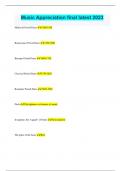
-
Music Appreciation final latest 2023
- Exam (elaborations) • 5 pages • 2023
-
Available in package deal
-
- $9.99
- + learn more
Music Appreciation final latest 2023 Medieval Period Dates 1100-1450 Renaissance Period Dates 1450-1600 Baroque Period Dates 1600-1750 Classical Period Dates 1750-1820 Romantic Period Dates 1820-1900 Pitch The highness or lowness of sound In ragtime, the "ragged" off beats Synocopation The pulse of the beats Beat The speed of the beats Tempo Loudness or softness of sounds Dynamic level A musical outline Form Acapella Sung without instruments Timbre The quality of a musical sound M...
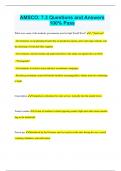
-
AMSCO: 5.7 Questions and Answers Already Passed
- Exam (elaborations) • 6 pages • 2023
- Available in package deal
-
- $8.49
- + learn more
AMSCO: 5.7 Questions and Answers Already Passed How did the development of economic systems, ideologies, and institutions contribute to change between 1750 and 1900? Economic Systems - *Corporations* minimized risk - *Monopolies* = superiority - *Transnational companies* gained immense wealth and influence - Corporations allowed for large-scale economic activity and spread risk, making investments safer (also gained a lot of political power) Ideologies - *Cecil Rhodes* idea for a railroad proj...
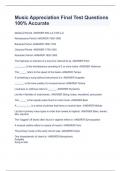
-
Music Appreciation Final Test Questions 100% Accurate
- Exam (elaborations) • 3 pages • 2023
-
Available in package deal
-
- $9.19
- + learn more
Medieval Period -ANSWER 500 a.d-1450 a.d. Renaissance Period -ANSWER 1450-1600 Baroque Period -ANSWER 1600-1750 Classical Period -ANSWER 1750-1820 Romantic Period -ANSWER 1820-1900 The highness or lowness of a sound is referred to as -ANSWER Pitch ________ is the simultaneous
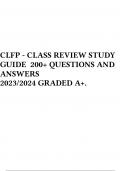
-
CLFP - CLASS REVIEW STUDY GUIDE 200+ QUESTIONS AND ANSWERS 2023/2024 GRADED A+.
- Exam (elaborations) • 18 pages • 2023
-
- $9.49
- + learn more
CLFP - CLASS REVIEW STUDY GUIDE 200+ QUESTIONS AND ANSWERS 2023/2024 GRADED A+. CLFP - CLASS REVIEW STUDY 2023 1. When should lessor register as foreign corp?: Within a state ... Good - stock of them Services offered Inspection or repair of property Office/employees Negotiated contracts 2. What is dode of Hammurabi?: - 1750 BC - Acknowledges leasing of personal property in his code of laws - First record of leasing law 3. Early examples of true lease?: - Phoenicians shipping exper...
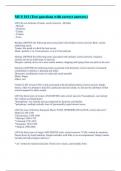
-
MUS 101 (Test questions with correct answers)
- Exam (elaborations) • 4 pages • 2023
- Available in package deal
-
- $8.49
- + learn more
LIST the six elements of music correct answers - Rhythm - Melody - Harmony - Timbre - Texture - Form Rhythm (DEFINE the following terms associated with rhythm) correct answers Beat- a pulse underlying music Tempo- the speed at which the beat occurs Meter- patterns 2 or 3 beat patterns, ever 4/5 beat patterns Melody (DEFINE the following terms associated with melody) correct answers Conjunct- melody moves by small steps or intervals Disjunct- melody moves in a more erratic manner,...
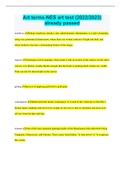
-
Art terms-NES art test (2022/2023) already passed
- Exam (elaborations) • 44 pages • 2023
- Available in package deal
-
- $10.49
- + learn more
Art terms-NES art test (2022/2023) already passed tenebrism Italian, tenebroso (murky), also called dramatic illumination, is a style of painting using very pronounced chiaroscuro, where there are violent contrasts of light and dark, and where darkness becomes a dominating feature of the image. impasto technique used in painting, where paint is laid on an area of the surface (or the entire canvas) very thickly, usually thickly enough that the brush or painting-knife strokes are visible. Paint c...
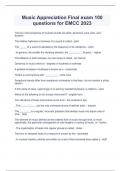
-
Music Appreciation Final exam 100 questions for EMCC 2023
- Exam (elaborations) • 6 pages • 2023
-
- $11.99
- + learn more
The four main properties of musical sounds are pitch, dynamics, tone color, and - duration The relative highness or lowness of a sound is called - pitch The _____ of a sound is decided by the frequency of its vibrations. - pitch . In general, the smaller the vibrating element, the __________ its pitch. - higher The distance in pitch between any two tones is called - an interval Dynamics in music refers to - degrees of loudness or softness A gradual increase in loudness is known...
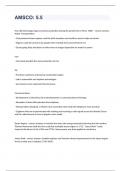
-
AMSCO 5.5 question and answers graded A+ 2023/2024
- Exam (elaborations) • 2 pages • 2023
- Available in package deal
-
- $9.99
- + learn more
AMSCO 5.5How did technology shape economic production during the period from 1750 to 1900? - correct answers Water Transportation - Coal-powered steam engines could be built anywhere and could be used on ships and trains - Engines could be turned on by people when needed and turned off when not - Ocean-going ships and boats on lakes were no longer dependant on winds for power Iron - Coal made possible the mass production of iron Oil - Precision machinery and internal combustion engine...

-
_AP World History_ Unit 4 Study Guide/Unit 4: Transoceanic Interconnections Study Guide
- Exam (elaborations) • 18 pages • 2023
-
- $10.49
- + learn more
1. Describe technological diffusions that occurred in the 1450-1750 time period. Name the technology, its origins, and where it diffused. - The astrolabe was spread by Muslim merchants and travelers to Europe, it was used for navigating on water. - The compass was diffused from Asia(China), to Europe. It provided further developments in ocean travel. - Cartography/map making and the knowledge of wind patterns improved navigation and spread by Europeans. 2. Describe new technologies of th...
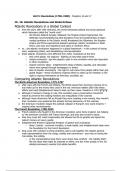
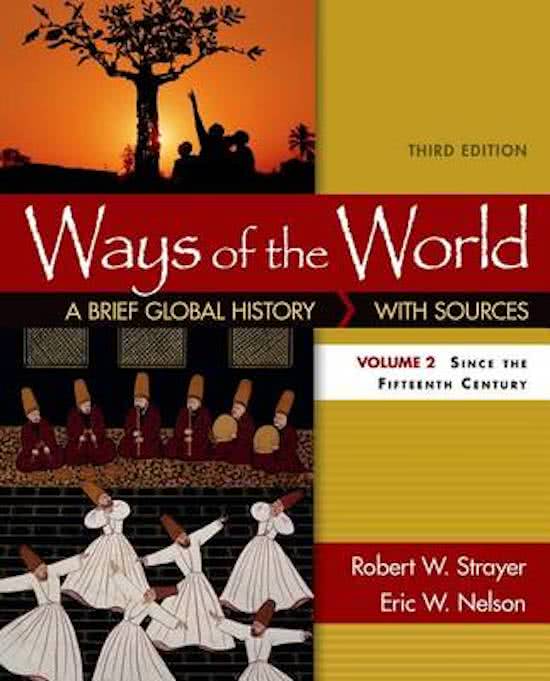
-
Ways of the World: A Brief Global History with Sources - AP World History - Unit 5: Chapters 16 and 17
- Summary • 8 pages • 2024
- Available in package deal
-
- $3.99
- + learn more
Unit 5: Revolutions (1750–1900) - Chapters 16 and 17 covers unit 5 for the ap world exam notes on all of the sections, works well to study for the AP exam or just for a review. these are the notes i used to get a 5 on the ap world exam, a 96.06% in the first semester, and a 97.87% in the second semester. chapter 16 covers atlantic revolutions from . it focuses on 4 revolutions: the American, French, Haitian, and Spanish American revolutions. it also talks about movements that began as...

Did you know that on average a seller on Stuvia earns $82 per month selling study resources? Hmm, hint, hint. Discover all about earning on Stuvia


